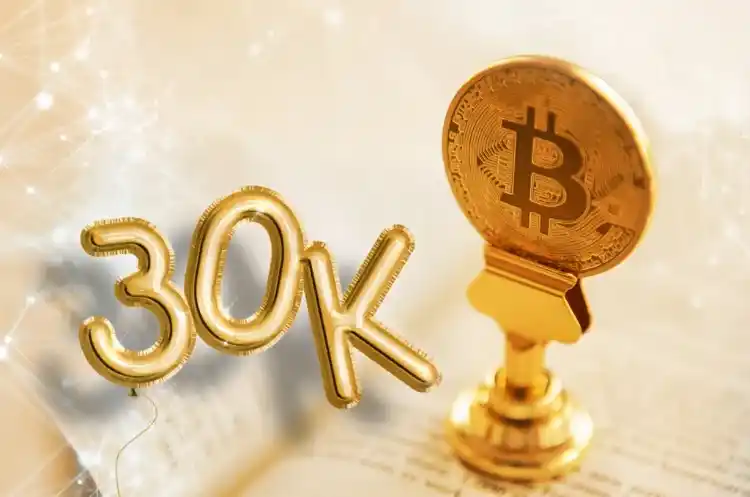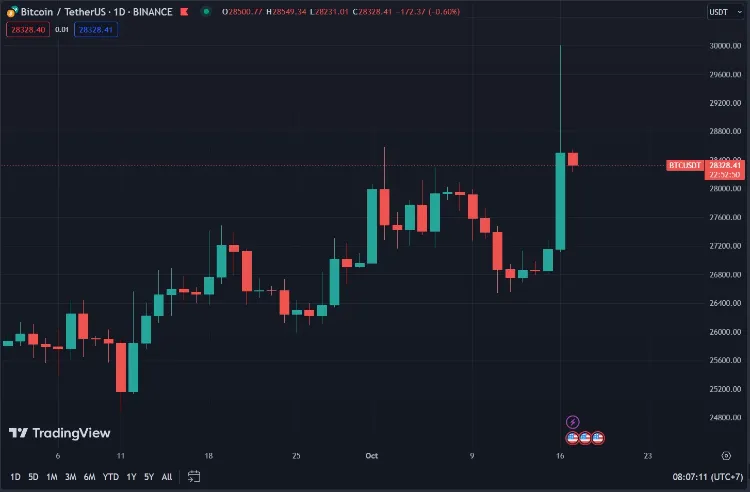The rapid surge in Bitcoin to $30,000
On Monday, some reports claimed that the U.S. Securities and Exchange Commission (SEC) had finally given the green light to a Bitcoin spot ETF. Despite the uncertainty surrounding these reports, the price of BTC immediately responded with a sharp increase to approximately $30,000.
While the SEC has approved several ETFs based on Bitcoin futures contracts, the regulatory body has been delaying and rejecting all applications for a spot ETF for over a decade. Hopes were rekindled earlier this year when the world’s largest asset management company, BlackRock, applied for such a project. However, the SEC postponed the final decision on BlackRock’s application and similar applications from other entities that swiftly followed suit.
On Monday, October 16th, news from multiple sources suggested that the Commission had finally approved such a product for U.S. citizens’ access. The price of the underlying cryptocurrency immediately surged. It had already risen to $28,000, as reported earlier today, but the speculation surrounding approval pushed it up by an additional $2,000.
As a result, Bitcoin reached its highest price in over two months, just below $30,000. However, BTC retraced by approximately $1,500 as the news remained unconfirmed.
Update: Shortly after the news broke, some media outlets reconsidered the situation and debunked the rumors. BlackRock was one of the first companies to do so, with their spokesperson stating that the iShares Bitcoin spot ETF proposal was still under review.
As predicted, the cryptocurrency’s price further declined to around $28,000.
>>> Whales Accumulate 3.2 Million Dollars in Bitcoin and Embrace MicroStrategy’s Bold Stance
BlackRock Clarifies Bitcoin ETF Rumors, Calls for Caution in Market Reaction
BlackRock, the world’s largest asset manager, has debunked rumors that their highly anticipated Bitcoin Exchange-Traded Fund (ETF) received approval from the U.S. Securities and Exchange Commission (SEC).
The rumors had spread like wildfire, causing a rapid increase in Bitcoin’s price for a short period. It surged from over $1,000, starting at $27,944 and peaking at $29,397.
A respected Fox Business journalist, Elenor Terret, declared that she had spoken with BlackRock, and they refuted all such claims.
🚨BlackRock has just confirmed to me that this is false. Their application is still under review. https://t.co/XIfIWZ0Ule
— Eleanor Terrett (@EleanorTerrett) October 16, 2023
This chain of events began with a misleading report falsely asserting that the SEC had endorsed BlackRock’s Bitcoin ETF. As expected, it sent shockwaves throughout the cryptocurrency market. Retail and institutional investors rushed to seize what they believed to be a quick profit opportunity.
What can we learn from this incident?
Analysts within the industry, like Twitter user @ali_charts, promptly pointed out that if an ETF were truly approved, Bitcoin’s price would “surge.”
One lesson to be learned from this mess is that when the #Bitcoin ETF actually gets approved $BTC price will moon!
So would you rather wait for the so-called “$20,000” target or start DCAing in the event of a correction?
Buy the rumor and sell the news!
Start your DCA… https://t.co/GExDqoWtH1
— Ali (@ali_charts) October 16, 2023
Reacting to unverified news and rumors is not uncommon in the cryptocurrency market. There have been numerous instances of price fluctuations driven by false information, illustrating how susceptible and speculative the cryptocurrency market can be.
Reactions of Traders and Investors
Traders and investors often react emotionally to news and rumors, leading to hasty decisions. Interacting with unverified information can result in significant financial losses, particularly in the highly volatile cryptocurrency market.
Making impulsive investment decisions based on unverified information is a challenge that some traders and investors face during such news developments. Even if the misinformation is corrected, the damage has already been done. This can undermine trust in both regulatory agencies and the overall market, making it more challenging for legitimate projects to receive approval and support.







